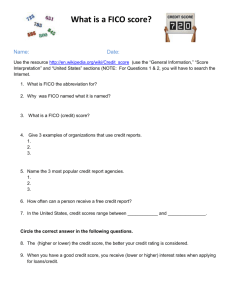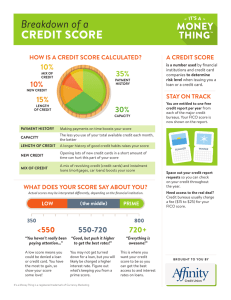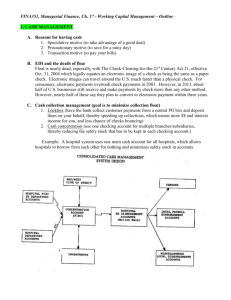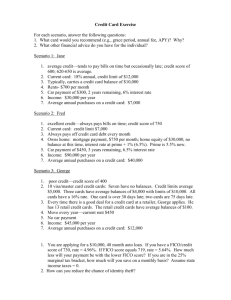SMART MONEY CREDIT THE TRUE STORY 1
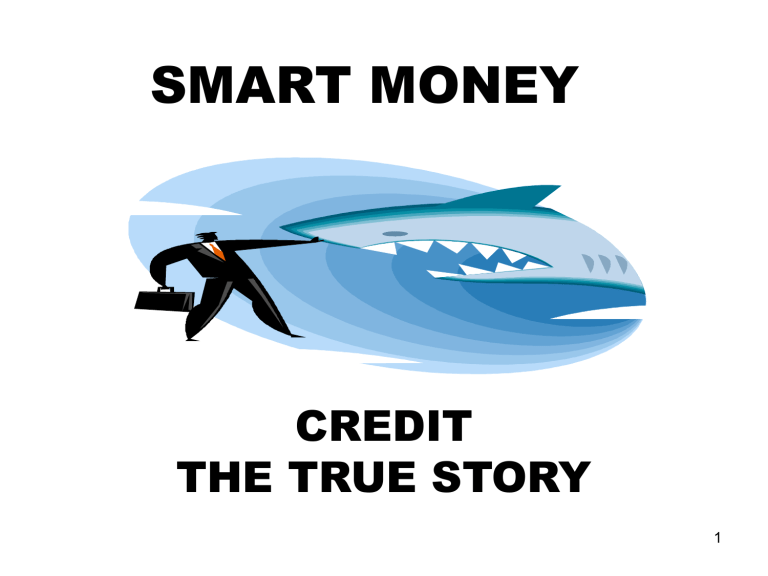
SMART MONEY
CREDIT
THE TRUE STORY
1
What is Credit?
• An arrangement to receive cash, goods, or services now, and pay for them in the future.
• A claim against Future
Income.
• A reduction in Disposable
Income during the time period the Credit is repaid.
2
Why do you need Credit?
• It enables people to enjoy goods and services now, and pay for them in the future.
• You may not have enough cash to pay for the good or service, and it may take a very long time to save the necessary funds.
• The proper use of Credit Cards allows consumers to postpone payment of goods, earning interest on the funds that would have been paid in cash.
3
Where do you obtain Credit?
• Commercial Banks
• Consumer Finance
Companies
• Credit Unions
• Life Insurance
Companies
• Federal Savings Banks
• Credit Card Companies
4
What determines if you will get the Credit desired?
1. CHARACTER – Will you repay the loan?
2. CAPACITY – Can you repay the loan?
3. CAPITAL – What are your
Assets and Net Worth?
4. COLLATERAL – What if you don’t repay the loan?
5. CONDITIONS – What if your job is insecure?
5
Other Creditworthiness
Factors
• AGE (ECOA)
• PUBLIC ASSISTANCE
• HOUSING LOANS
Care must be taken not to violate the conditions of the Equal
Credit Opportunity Act, or protected classes under the
Civil Rights Act of 1964, and its extensions.
6
Credit Reports
• Nowadays, due to the glut of consumers and the need to save time, grantors of credit have come to rely on Credit Reports.
• There are three (3) major Credit Reporting
Bureaus , and each publishes its own form of a
FICO Score.
• FICO is the acronym for Fair Isaac
Corporation, the developer of the algorithm and program used to calculate a FICO Score
(1956).
7
What’s in your Credit
Report?
• Personal Information
• Accounts
• Inquiries
• Negative Items
According to independent research
Credit Scoring is not unfair to minorities or those with little
Credit History.
8
FICO Scores
• It’s intention is to measure your Credit Risk, based on your current FICO Score.
• The Scores range between 300 and 850.
• FICO Scores are based on:
1. Payment History (35%)
2. Amounts Owed (30%)
3. Length of Credit History (15%)
4. New Credit (10%)
5. Type of Credit Used (10%)
9
FICO Scores
continued
• The Median FICO Score is 723.
• Higher Scores mean Lower Interest Rates.
• Most Lenders based Approval on FICO
Scores.
• Many Lenders use the FICO Score in conjunction with their own Application.
• Scores will vary between different Credit
Bureaus.
10
FICO Scores
continued
1. Equifax produces a BEACON Report.
2. Experian produces an Experian/Fair
Isaac Risk Model.
3. TransUnion produces a FICO Risk
Score, Classic.
Any and all Bureaus may be contacted by your
Lender.
11
Why is my FICO Score ‘X’?
• Depends on your Credit track record reflected in the FICO Score.
• Items will remain on your Credit
Report for between 7 and 10 years ; it’s up to you to check your
Report for Accuracy.
• Do not allow debts to be placed with
Collection Agencies.
• Do not permit balances on your
Credit Cards, pay them monthly.
12
FICO Payment History (35%)
• Almost 65% of all Credit
Reports show no late payments.
• This is the largest portion of your FICO Score.
• Take care of past debts and ensure they are corrected on your Credit Report.
13
FICO Amounts Owed (30%)
• What is the total amount owed?
• How many accounts have balances outstanding?
• How close to ‘limits’ are the revolving accounts?
• What is remaining on any installment loans?
• Is your debt over suggested ratios?
14
FICO Length of Credit
History (15%)
• How long have you been using
Credit?
• How long have specific accounts been established?
• How long has it been since you’ve used specific accounts?
• Do not open and close accounts too quickly.
Let them ‘season’ for a couple of years.
15
FICO New Credit (10%)
• Are you taking on too much debt
(ratios)?
• How many ‘new’ accounts do you have?
• How long has it been since you’ve opened a new account?
• What has been the length of time between and number of Credit
Inquiries?
• What is your most recent Credit
History?
16
FICO Types of Credit in Use
(10%)
• How well are you managing your current Credit?
• What kinds of Credit
Accounts do you have?
• Closed Accounts stay on your record, so don’t try to
‘escape’ an existing debt.
17
Facts
• A ‘good’ FICO Score is determined by the Lender.
Statistics are published by Fair
Isaac Corporation.
• If you’re turned down for Credit, you should receive a written statement stating the reason for rejection of your application.
• Manage your Credit so you pay the best available interest rates, terms, etc. when you need
Credit.
18
Now you know …
CREDIT
THE TRUE STORY
19
